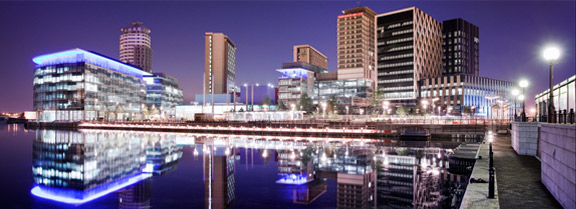
The news that the BBC was to move several departments out of London and into Manchester was first announced in 2004, following which a fierce bidding war took place between the Peel-led MediaCity proposal and the Manchester city council backed Oxford Road bid.
The final decision to set up its new enhanced Northern shop in Salford subsequently also led to a somewhat miffed Manchester council securing chunky sums out of the EU to help it fund the Sharp Project in east Manchester.
The BBC basically and belatedly came to realise that it was under-performing – compared to ITV and increasingly Sky for sports – in terms of audience share and approval in the North of England. And in terms of actual programme production, the hard facts were even starker: although the ‘North’ accounts for almost 25% of all BBC licence fee payers, well under 10% of TV programmes were being made in the North and less than 7% of network programme-making budget was being spent in the North. (The latter figure is now almost 10%)
The BBC decided to address the disparity with a major investment that would not only be meaningful in a way that few could guess but also to create a genuine new centre of excellence that would and could provide BBC staffers with a long-term alternative base to develop their careers.
In investment and production terms, few could question the BBC’s intent was genuine and has been honoured, while beyond the narrow world that the media sometimes exists in, the BBC itself claims that the approval rating from audiences in the North has narrowed from what was a 3-4% difference between the North and South down to a 1-2% approval rating difference.
And in financial terms, by adding in the knock-on effect of work being done by regional suppliers, it is claimed that just shy of £400m of GVA (gross value added) has been generated for the regional economy as a whole on the back of the BBC’s own £180m investment.
And the figure keeps steadily rising as more operations are transferred North, sometimes with little or no publicity, as is the case with the substantial increase in the marketing and audience teams at Salford or the decision to move large parts of the BBC’s new starter programme from London to Manchester.
In total, 24 BBC departments are now either based or represented at BBC North.
Three divisions: Children’s, Sport and Radio 5 live are run from Salford accounting for over 800 of the 2,500 plus BBC staff working at MediaCity.
Other major operations include BBC Breakfast,Current Affairs, six of the BBC’s online products including the BBC homepage, Learning, Marketing & Audiences, Religion & Ethics (previously based in Oxford Road), Entertainment, Comedy, Drama, Research & Development, parts of BBC Radios 2,3,4 and 6Music, regional news and BBC Radio Manchester.
Salford is also the new home of the BBC Philharmonic Orchestra.
And although the Daily Mail might not like to lead with the news, it appears the move North has proved much more popular with BBC staffers in London than has been portrayed in several baying headlines. Well over 50% of the staff now in Salford moved North from London, a figure which is roughly double the number that a normal relocation would expect.

Some programmes said to be moving include the Radio 4 consumer programme You and Yours, the TV station BBC Three and various administrative posts.
And these figures don’t really take account of the broadening investments that are now taking place in Salford and elsewhere across the region, direct consequences of the BBC’s decision in 2004.
From WPP’s decision to expand its Farm subsidiary’s operations to Salford, to BetFred establishing its own TV station and SIS moving in, the Landing, the Sharp Project, the new set of Corrie – and the investment that will now take place back at the 30 acre plus site around Quay St – all of these along with Peel’s now 58% stake in Pinewood – and a likely Northern operation at some stage – would not have occurred had the BBC not decided in 2004 that its accent could and should be a tad more Northern.
And as they sometimes say, it appears the best is yet to come.










